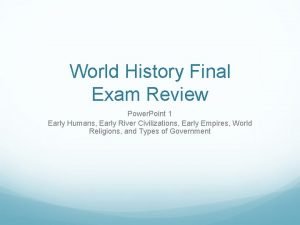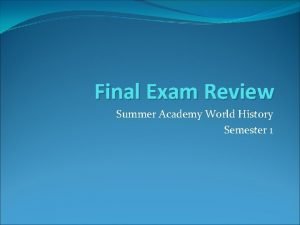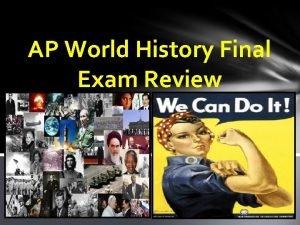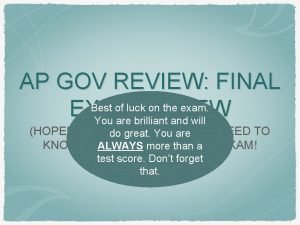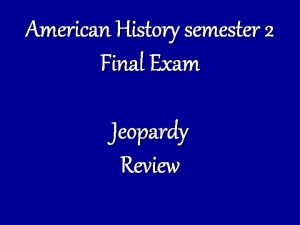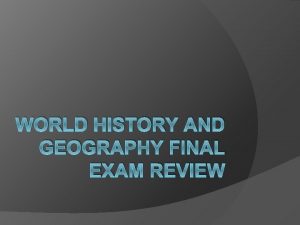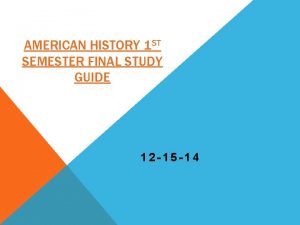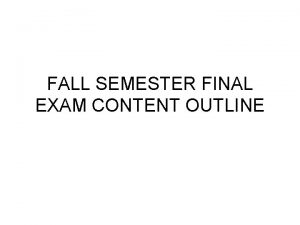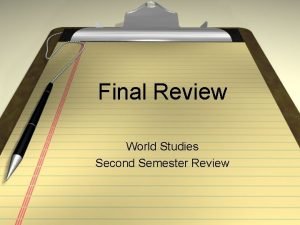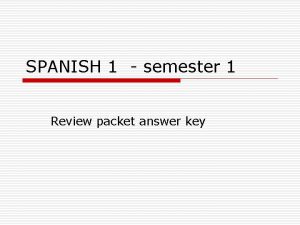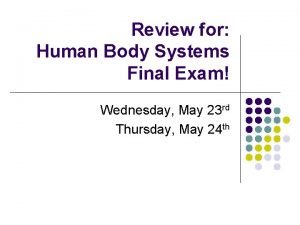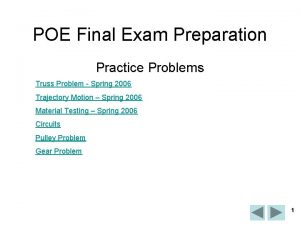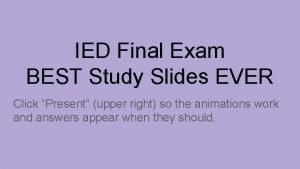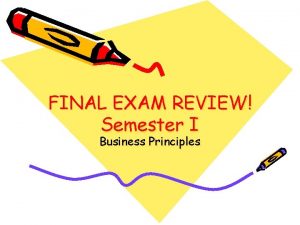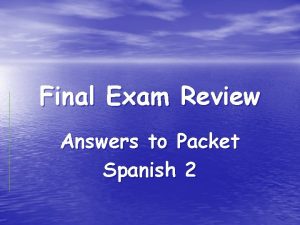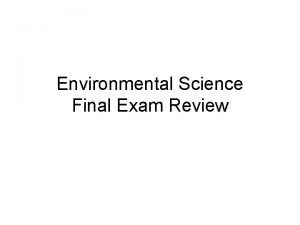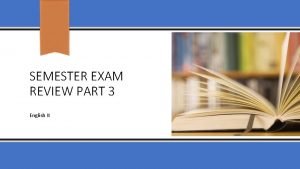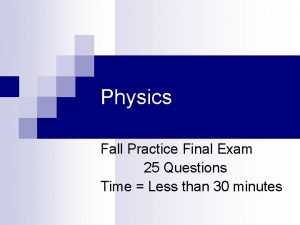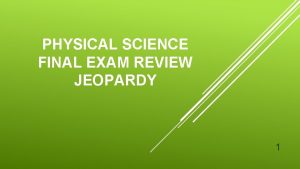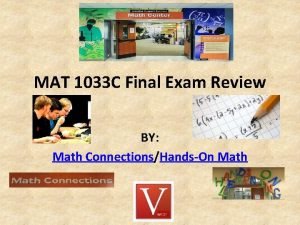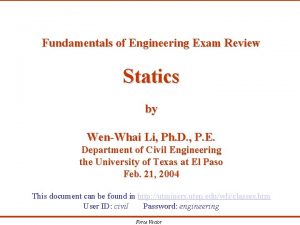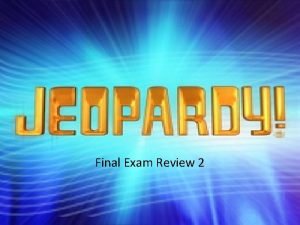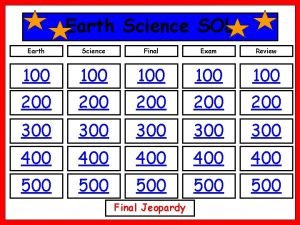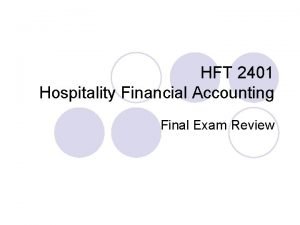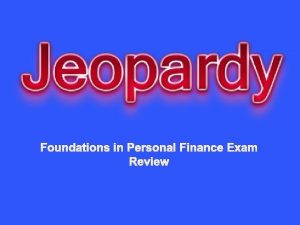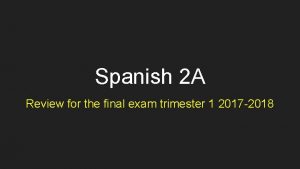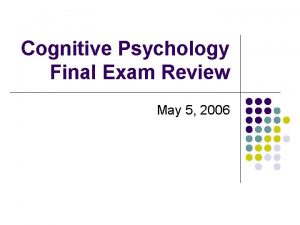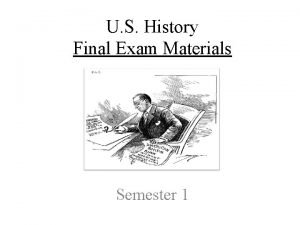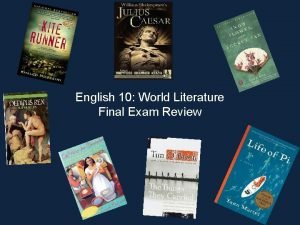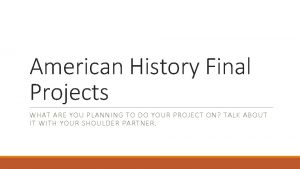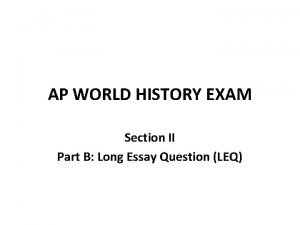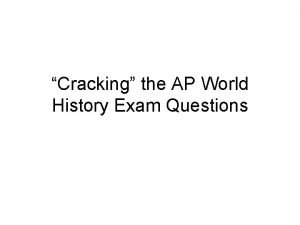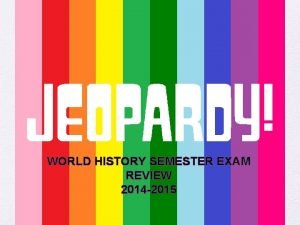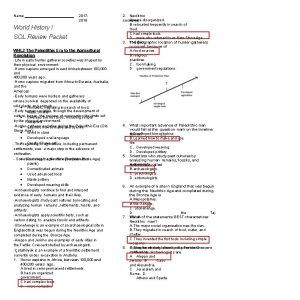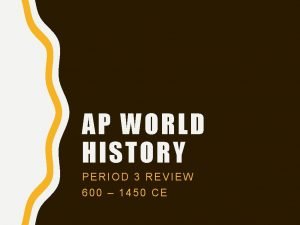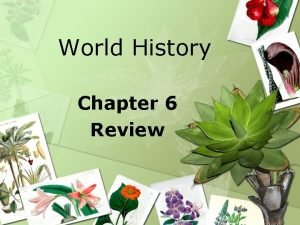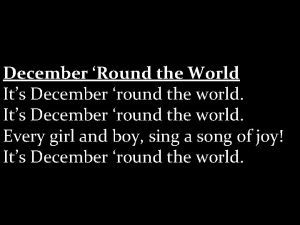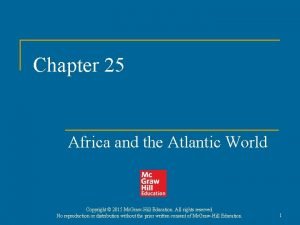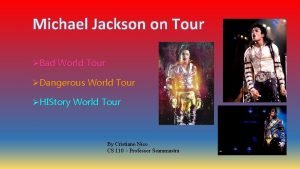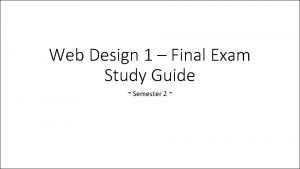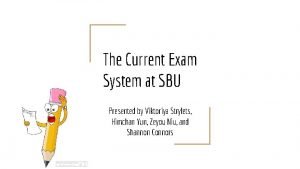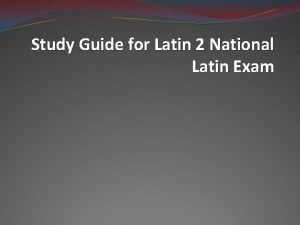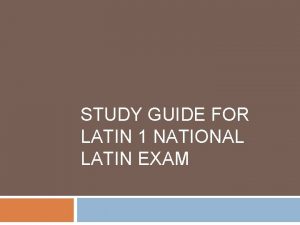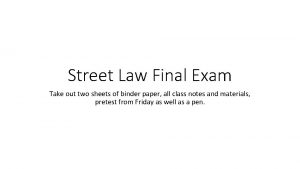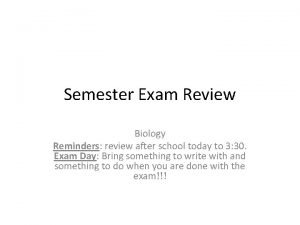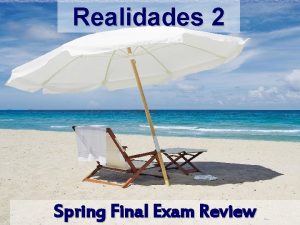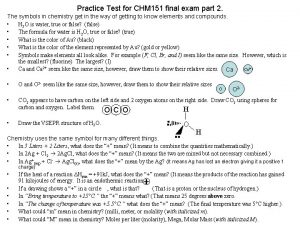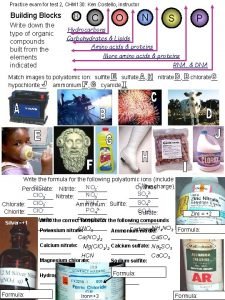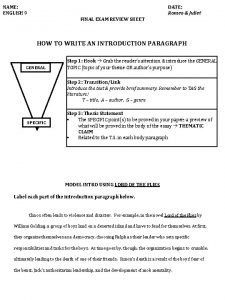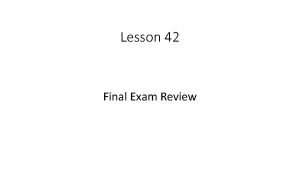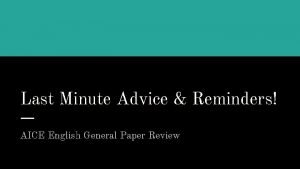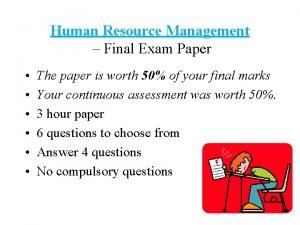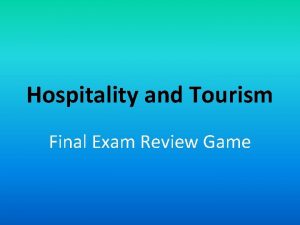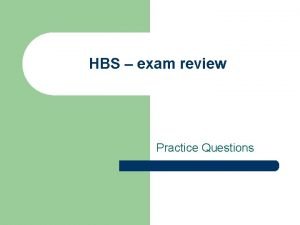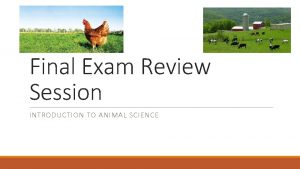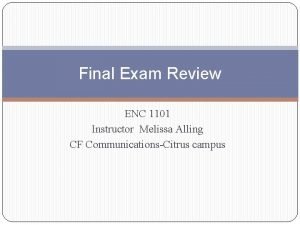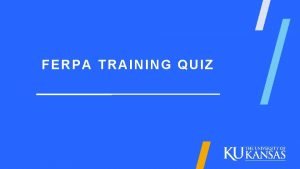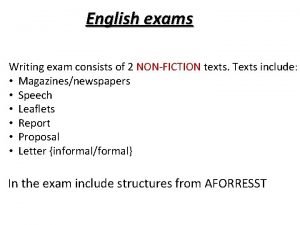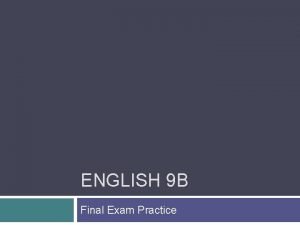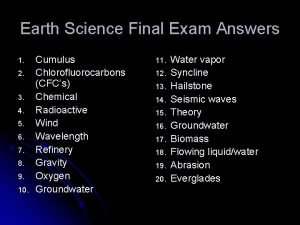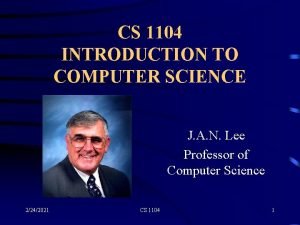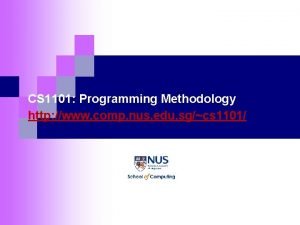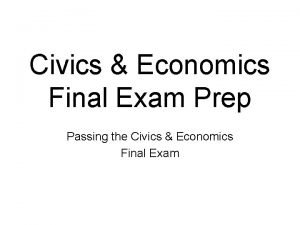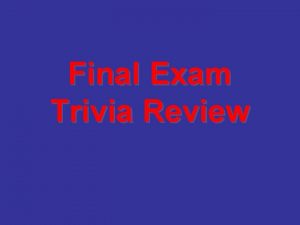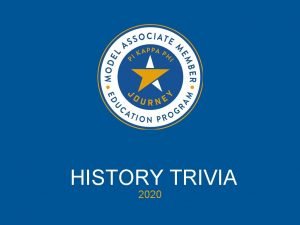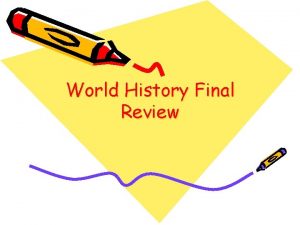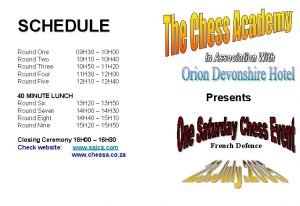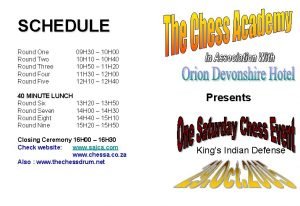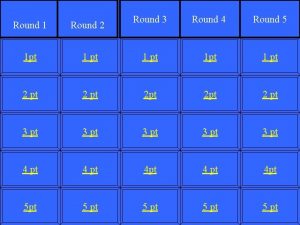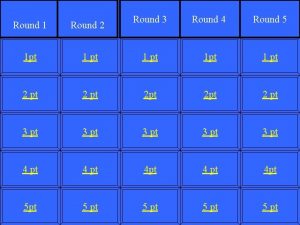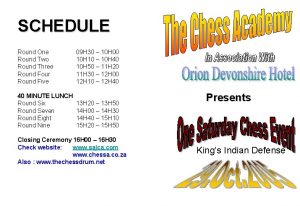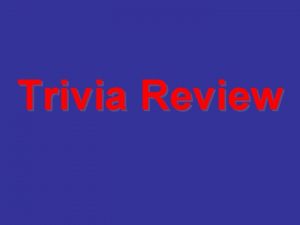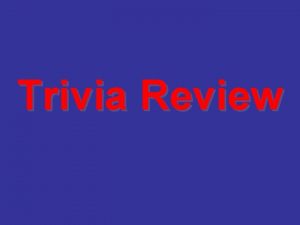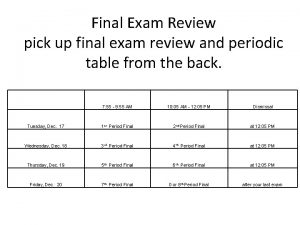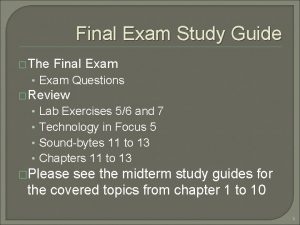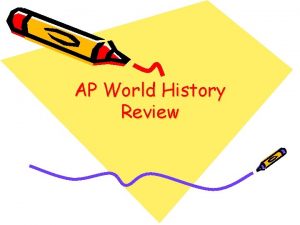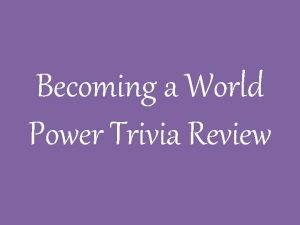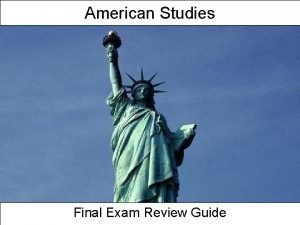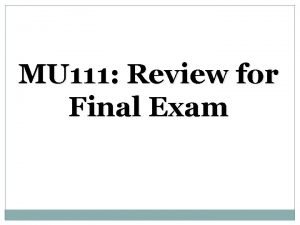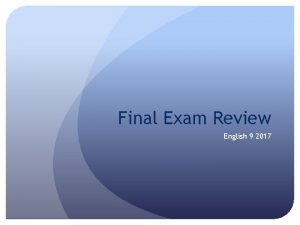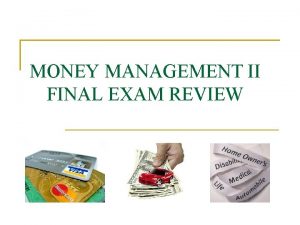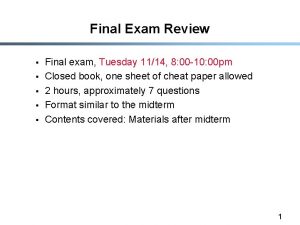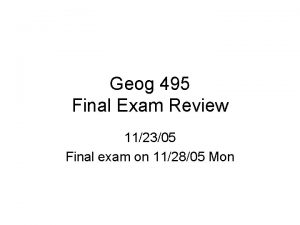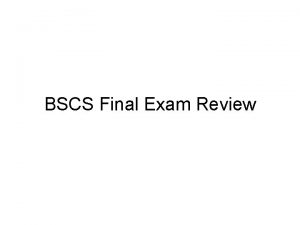World History Final Exam Trivia Review Round 1

































































- Slides: 65

World History Final Exam Trivia Review!

Round 1: Absolutism, English Civil War & Enlightenment

Round 1: Question 1 • QUESTION: Define ABSOLUTISM • ANSWER: A form of government in which the monarch has unlimited power & seeks to control all aspects of society

Round 1: Question 2 • QUESTION: According to the Divine Right Theory, monarchs are ONLY answerable to ______. • ANSWER: God

Round 1: Question 3 • QUESTION: This Russian czar was the primary proponent of westernization in Russia • ANSWER: Peter the Great

Round 1: Question 4 • QUESTION: Why did James VI of Scotland become King of England after Elizabeth I died? • ANSWER: She never married, so she didn’t have an heir, and he was her cousin

Round 1: Question 5 • QUESTION: Name the two sides of the English Civil War, as well as who they supported • ANSWER: Roundheads – Parliament; Cavaliers – King

Round 1: Question 6 • QUESTION: What is the term for the return of the monarch to the English throne after the end of Cromwell’s rule…and for a bonus point, who was that monarch? • ANSWER:

Round 1: Question 7 • QUESTION: After the English Civil War and Glorious Revolution, how did the English Kings differ from the French Kings? • ANSWER: English kings’ powers were limited by

Round 1: Question 8 • QUESTION: Louis XIV revoked the Edict of Nantes. Who did this affect and why? • ANSWER: Huguenots (French Protestants) were no longer given the freedom to worship

Round 1: Question 9 • QUESTION: Philosopher who believed government should protect people’s natural rights and if they don’t, people have the right to overthrow them • ANSWER: Locke

Round 1: Question 10 • QUESTION: According to Locke, the three natural rights of people • ANSWER: Life, liberty and property

Round 2: French Revolution

Round 2: Question 1 • QUESTION: List at least THREE factors that contributed to France’s pre-Revolutionary debt. • ANSWER: Aid to the American Revolution; foreign wars; extravagance of the royal court; crop failure

Round 2: Question 2 • QUESTION: What was the significance of the Tennis Court Oath? • ANSWER: An oath in which the National Assembly (3 rd estate) promised to write a new constitution for France

Round 2: Question 3 • QUESTION: This event, which symbolized the first successful attack on the tyranny of the monarchy, is known for being the first violent event of the Revolution. • ANSWER: The Storming of the Bastille

Round 2: Question 4 • QUESTION: After the execution of Louis XVI, these two political factions formed in the National Convention. What were they & what were their views? • ANSWER: The Jacobins (extreme radicals) & the Girondists (moderate radicals)

Round 2: Question 5 • QUESTION: What was the Reign of Terror and how did it end? • ANSWER: Period of time when radical Jacobins executed anyone thought be going against the revolution. Ended when Robespierre was executed.

Round 2: Question 5 • QUESTION: How did Napoleon come to power? • ANSWER: By Coup D’etat

Round 2: Question 6 • QUESTION: Name two reasons Napoleon was able to win the support of the French people after he seized power • ANSWER: He was a successful military leader; protected equality before the law; brought order and stability

Round 2: Question 7 • QUESTION: This movement inspired revolution in France as well as in Latin America • ANSWER: The Enlightenment

Round 2: Question 8 • QUESTION: What was a common reason for revolution in Latin America? • ANSWER: To gain independence from colonial powers

Round 3: Era of Global Change & Conflict

Round 3: Question 1 • QUESTION: Name two reasons why Great Britain took the lead in the Industrial Revolution • ANSWER: More capital (money), natural resources, larger labor supply (b/c of improvements in agriculture), & entrepreneurship (people willing to invest and take

Round 3: Question 2 • QUESTION: Term for an increase in the number, size and population of cities • ANSWER: Urbanization

Round 3: Question 3 • QUESTION: Describe 2 problems created by the Industrial Revolution • ANSWER: Long workdays/workweeks; Child Labor; Unsafe working conditions; Pollution; Crowded and unsanitary cities; Increased inequality between the factory owners/workers

Round 3: Question 4 • QUESTION: Identify a major difference between Laissez-Faire Capitalism and Socialism • ANSWER: Ownership rights, Govt regulation of businesses, Govt protection of workers rights

Round 3: Question 5 • QUESTION: This man, who is often regarded as the Father of Capitalism, believed that competition and supply & demand should regulate the economy • ANSWER: Adam Smith

Round 3: Question 6 • QUESTION: According to 19 th century economist Karl Marx, who are the “HAVES” and the “HAVENOTS”? • ANSWER: • Haves = Bourgeoisie (Middle Class/Owners) • Have-Nots = Proletariat (Working

Round 3: Question 7 • QUESTION: List 3 factors that aid in the rise of nationalism within any given territory • ANSWER: Shared History; Same Language; Same Ethnicity/Culture; Same Religion; National Cause (Unification/Separation)

Round 3: Question 8 • QUESTION: Identify 3 MOTIVES for Imperialism in the 19 th Century • ANSWER: Loss of lands in New World; More/new resources; “Civilizing” mission; Nationalism

Round 3: Question 9 • QUESTION: Explain the cause of the Sepoy Rebellion in India • ANSWER: Gun cartridges were greased with animal fat (pig/cow) – offended their religions (Muslim/Hindu)

Round 3: Question 10 • QUESTION: This policy allowed all western powers to have equal trading rights in China • ANSWER: • Open Door Policy

Round 4: WWI

Round 4: Question 1 • QUESTION: Historians generally claim that these are the FIVE underlying causes of World War I. • ANSWER: Militarism, Alliances, Nationalism, Imperialism and Anarchy

Round 4: Question 2 • QUESTION: Explain the reason for which Gavrillo Princip assassinated the archduke of Austria-Hungary, Franz Ferdinand. • ANSWER: Ferdinand wanted to bring the Slavic people under Austro -Hungarian control, while the Slavic people wanted to unify

Round 4: Question 3 • QUESTION: This was the term used to describe the American attitude towards World War I in the year 1914. • ANSWER: Isolationism

Round 4: Question 4 • QUESTION: Name 3 reasons the U. S. entered the war on the side of the Allies • ANSWER: British propaganda against Germans; Sinking of U. S. ships; Zimmermann Telegram

Round 4: Question 5 • QUESTION: Name two factors contributing to the Russian Revolution • ANSWER: Incompetence of the Czar; Food shortages; Large number of deaths in WWI

Round 4: Question 6 • QUESTION: Who was the leader of the Bolsheviks and what type of government did they want to establish in Russia? • ANSWER: Vladimir Lenin; Socialist/Communist

Round 4: Question 7 • QUESTION: This was the name given to Woodrow Wilson’s proposed plan for peace. • ANSWER: The Fourteen Points

Round 4: Question 8 • QUESTION: What is the main difference between the Treaty of Versailles and Wilson’s 14 Points? • ANSWER: Treaty of Versailles blamed/punished Germany; Wilson’s did not

Round 5: Between the Wars & WWII

Round 5: Question 1 • QUESTION: This treaty, signed by the French & the Germans in 1925 signified an attempt to establish a lasting peace between the former enemies. • ANSWER: The Locarno Treaty

Round 5: Question 2 • QUESTION: List at least three major characteristics of fascism, as seen in Nazi Germany. • ANSWER: Extreme militarism, extreme nationalism, heavy censorship, youth indoctrination, propaganda, separate social classes, etc.

Round 5: Question 3 • QUESTION: During the 1930 s, one of Hitler’s primary goals was to establish the Third German Empire – an empire that would supposedly last for 1, 000 years. What was the name of this empire? • ANSWER: The Third Reich

Round 5: Question 4 • QUESTION: Explain the decision that was made at the Munich Conference. • ANSWER: Great Britain & France “allowed” Hitler to take Czechoslovakia, as he promised that it was his “last territorial demand”

Round 5: Question 5 • QUESTION: This diplomatic agreement was signed by both Hitler and Stalin; agreed to split Poland into two different zones of occupation. • ANSWER: Nazi-Soviet Non. Aggression Pact

Round 5: Question 6 • QUESTION: In the year 1940, these were the primary AXIS powers. • ANSWER: Germany, Italy and Japan

Round 5: Question 7 • QUESTION: In 1939, this event marked the beginning of World War II. • ANSWER: The German invasion of Poland (September 1 st)

Round 5: Question 8 • QUESTION: Explain the conflict that emerged between the U. S. and Japan in the months preceding the bombing of Pearl Harbor. • ANSWER: Japan was attempting to build an empire; U. S. felt threatened; warned to stop; did not stop; oil embargo; bombing

Round 5: Question 9 • QUESTION: In terms of the Soviet Union, what was the significance of D-Day? • ANSWER: It was the opening of the 2 nd front in Western Europe (Stalin had been asking for…)

Round 5: Question 10 • QUESTION: Describe the Nazi attitude toward their own race and toward others • ANSWER: The Germans were a superior race of people; All others were inferior

Round 5: Question 11 • QUESTION: What was “The Final Solution to the Jewish Question”? • ANSWER: Annihilation of the Jewish race, carried out through death camps

Round 6: The Cold War…& Beyond

Round 6: Question 1 • QUESTION: The term Churchill used to describe the division between western European democracies and eastern European communist countries • ANSWER: Iron Curtain

Round 6: Question 2 • QUESTION: Leader of the Communist Party who founded the People’s Republic of China • ANSWER: Mao Zedong

Round 6: Question 3 • QUESTION: Name the new organization that was tested when North Korea invaded South Korea after WWII • ANSWER: The United Nations

Round 6: Question 4 • QUESTION: The main reason the U. S. got involved in the Korean and Vietnam Wars • ANSWER: To stop the spread of communism (containment)

Round 6: Question 5 • QUESTION: Identify two countries we studied that got their independence from Great Britain following WWII • ANSWER: Israel, India, Ghana

Round 6: Question 6 • QUESTION: What was Mohandas Gandhi’s approach to India’s independence movement? • ANSWER: Non-violent/Passive Resistance; Civil Disobedience

Round 6: Question 7 • QUESTION: Reason India had to be partitioned into two states when it achieved independence • ANSWER: Division between Hindus and Muslims

Round 6: Question 8 • QUESTION: Name Gorbachev’s policy that restructured the Soviet Union’s economy to allow more local control and some private business • ANSWER: Perestroika

Round 6: Question 9 • QUESTION: Symbol of the Cold War that was removed starting in 1989 • ANSWER: The Berlin Wall

Round 6: Question 10 • QUESTION: Term for South Africa’s legal separation of the races AND the leader who was imprisoned for fighting against it • ANSWER: Apartheid; Nelson Mandela
 World history spring final exam review answers
World history spring final exam review answers World history first semester exam review
World history first semester exam review Ap world history jeopardy review game
Ap world history jeopardy review game Ap gov final review
Ap gov final review U.s. history semester 2 final exam
U.s. history semester 2 final exam World history and geography final exam study guide
World history and geography final exam study guide World history 1st semester final review answers
World history 1st semester final review answers Us history semester 1 final exam study guide answers
Us history semester 1 final exam study guide answers World history semester 2 final review packet
World history semester 2 final review packet Spanish 1 review packet
Spanish 1 review packet Human body systems final exam
Human body systems final exam Poe final review
Poe final review Ied final exam
Ied final exam Principles of business final exam answer key
Principles of business final exam answer key Spanish 2 final exam review packet
Spanish 2 final exam review packet Environmental science final review
Environmental science final review English 4 semester 2 exam
English 4 semester 2 exam Physics 20 final exam practice
Physics 20 final exam practice Physical science jeopardy
Physical science jeopardy Mat 1033 final exam answers
Mat 1033 final exam answers Statics exam 3
Statics exam 3 Zoology final exam review
Zoology final exam review Earth science sol review
Earth science sol review Algebra 1 final review packet
Algebra 1 final review packet Accounting final review
Accounting final review Personal finance final exam review
Personal finance final exam review Spanish 1 final review
Spanish 1 final review Psyc 1504 final exam
Psyc 1504 final exam Us history final exam semester 1
Us history final exam semester 1 World literature final exam
World literature final exam World history final project ideas
World history final project ideas Ap world history exam format
Ap world history exam format Ap world course and exam description
Ap world course and exam description Format of ap world history exam
Format of ap world history exam World history semester exam
World history semester exam World history ii sol review packet
World history ii sol review packet Apwh period 3
Apwh period 3 World history chapter 6 review
World history chapter 6 review Ap world history jeopardy review game
Ap world history jeopardy review game Round and round we go burning burning all aglow
Round and round we go burning burning all aglow Ap world history chapter 25 africa and the atlantic world
Ap world history chapter 25 africa and the atlantic world Countries michael jackson visited
Countries michael jackson visited Web design final exam
Web design final exam Sbu finals schedule
Sbu finals schedule Latin 2 final exam answers
Latin 2 final exam answers Latin 1 final exam answers
Latin 1 final exam answers Street law final exam
Street law final exam Difference between lytic and lysogenic cycle
Difference between lytic and lysogenic cycle Realidades 2 final exam
Realidades 2 final exam Chemistry 151 final exam
Chemistry 151 final exam Chm 130 chapter 12 practice problems answer key
Chm 130 chapter 12 practice problems answer key Romeo and juliet final exam study guide
Romeo and juliet final exam study guide 42 final exam
42 final exam I am not contraction
I am not contraction Hrm past exam papers with answers
Hrm past exam papers with answers Hospitality and tourism final exam
Hospitality and tourism final exam Hbs practice test
Hbs practice test Animal science final exam
Animal science final exam Enc 1101 final exam
Enc 1101 final exam Ferpa final exam answers
Ferpa final exam answers Creative nonfiction final exam
Creative nonfiction final exam Abc final exam practice test
Abc final exam practice test Earth science final exam answers
Earth science final exam answers Cs 1104 computer systems
Cs 1104 computer systems Cs 1101 programming fundamentals
Cs 1101 programming fundamentals Civics and economics final exam
Civics and economics final exam
